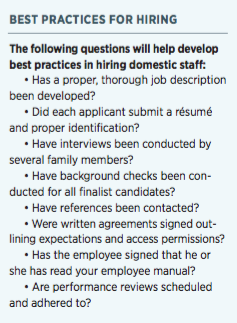For families of substantial means, the need to employ supportive staff grows as their assets increase. “Staff” may include nannies, chefs, drivers, gardeners, personal assistants and estate managers.
While many of these domestic employees end up being “part of the family,” certain precautions should prevail. Staff are often hired quickly as needs arise, but these employment arrangements can easily become complicated and expensive if not handled properly.
In fact, advanced planning is essential. Thinking through how an employee will meet the needs of your family will likely save you time, money and turnover in the future.
A first step is to determine whether family needs are project-based or long term in nature. This will help define who is an employee or an independent contractor and may change the hiring process and compensation structure.
For example, different hiring criteria will apply for staff being considered to watch children than for a gardener or chef.
Labor laws are complicated and vary by state, so it is best to consult people you already trust before hiring staff. Like the corporate world, domestic-staff employment involves legal, financial and risk-management due diligence. Employment agencies can provide guidance on these areas to some extent, but your attorney, accountant and insurance broker will assist you with the nuances of the employment transaction. A background check is also critical. While a candidate may offer excellent references, other red flags, such as criminal records or bad driving records, will not be revealed without a proper background check.
Hiring a domestic staff member may help relieve stress, but also increase personal liability and exposure.
Once qualified candidates have been identified, expectations need to be managed. Hiring domestic staff usually feels different from a typical employment transaction because of the personal and more frequent interaction involved. As a result, many families never put their expectations in writing, but a clear job description, a signed employment agreement and scheduled performance reviews, will help gather feedback and avoid confusion or disappointment on both sides of the table.
To further minimize exposure to risk, a family should be aware of typical claims, such as employee injuries, identity theft, property theft or wrongful termination lawsuits. Among other insurance coverages, an employment practices liability insurance (EPLI) policy should be considered to protect the family should an employee sue for an act of wrongful employment, such as discrimination, sexual harassment or wrongful termination.
It is also essential to document unusual behaviors or unmet expectations, for discussion before or during a performance review. In addition, families should create an employee manual, including details about expected behavior, access to information, guest visits and safety procedures. These measures may seem strict at first, but most employees will come to appreciate boundaries and rules that also enhance their own protection.
In short, families should remember that hiring a domestic staff member may help relieve stress, but it also increases personal liability and exposure. A rigorous initial vetting process decreases risk, but more importantly, open communication with staff and management about their expectations and responsibilities over time results in happier employees, fewer surprises and decreased cost in the long run.

This article was originally published in the October/November 2016 issue of Worth.
















